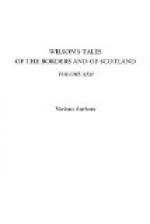of the son she loved in spite of his errors, he had
not ever yet felt the pangs of deep regret as they
came preluding amendment. A terrible influx of
feelings, which had been accumulating almost unknown
to him during months and months—for his
father had been dead only for a year and a half—pushed
up against all the strainings of a wild natural temperament,
and seemed ready to choke him, depriving him of utterance,
and making him appear the very coward he had been
depicting so sharply an hour before. A deep gloom
fell over him; nor was this rendered less inspissated
by the recollection that came quick as lightning,
that he was the only one known to the mistress of
the inn. And now, worse and worse—for
the same power that sent him that conviction threw
a suspicion over his mind which made him strike his
forehead with an energy alarming to his companions—no
other—“O, merciful God!” he
muttered—than that the man he had robbed
was his maternal uncle; the only man among the friends
of either his father or his mother who had shown any
sympathy to the bereaved family, who had fed them
and kept them from starvation, and by whom he had
been himself nourished. He had no power to speak
this: it was one of those thoughts that scathe
the nerves that serve the tongue, and which flit and
burn, and will not ameliorate their fierceness by the
common means given to man in mercy. It now appeared
to him as something miraculous why he did not recognise
him; but the occasion was one of hurry and confusion,
and so completely oblivious had he been in the agony
which came on him in an instant, that he even thought
that at the very moment he knew him, looking darkly,
as he did, through the handkerchief over his eyes.
In his despair, he meditated hurrying to Leith, and
with the five pounds getting a passage over the sea
somewhere, it signified nothing where, if away from
the scene of his crime and ingratitude; and this resolution
was confirmed by the additional thought that Mr. Henderson,
however good and generous, was a stern man—so
stern, that he had ten years before given up a beloved
son into the hands of justice for stealing; yea, stern
ex corde as Cato, if generous
ex crumena
as Codrus.
This resolution for a time brought back his love of
freedom and adventure. He would go to Hudson’s
Bay, and shoot bears or set traps for wild silver-foxes,
that would bring him gold; or to Buenos Ayres, and
catch the wild horse with the lasso; or to Lima, and
become a soldier of fortune, and slay men with the
sword. The gleam of wild hope was shortlived—his
triumph over his present ill a temporary hallucination.
The laurel is the only tree which burns and crackles
when green. The intention fled, as once more
the thought of his mother came, with that vigour which
was only of half an hour’s birth, and begotten
by young conscience on old neglect. They had
been trailing their legs along till they came to Inverleith
Row, where he behoved to have left his companions,




